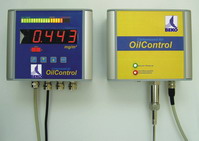 Sensitive applications such as food, electronics, medicine, painting plants, breathing air etc have to meet particularly high requirements concerning the purity of compressed air.
Sensitive applications such as food, electronics, medicine, painting plants, breathing air etc have to meet particularly high requirements concerning the purity of compressed air.
Activated carbon filters and adsorbers have only limited capacity to remove oil and its difficult to find the best point in time for changing elements. The concentration of oil vapours in the suction air is subject to considerable fluctuations and overloading can lead to damaged filter elements. Sudden oil break-through can cause high consequential costs.
In order to achieve higher process security in compressed air treatment Beko Instruments has developed measuring instruments for supervising the oil content. Conventional differential pressure manometers only indicate the due exchange of air de-oiling elements and fine filters. Serious defects, for example, pitting corrosion or assembly error are not covered by this device. Oil Control however, does not react to the rise of the differential pressure, but on changed remainder oil rates in the streaming compressed air. The residual oil content is measured according to the ion exchange method. The crucial advantages are:
· Not affected by moisture content
· Independence from changing flow conditions
· Freely adjustable alarm values (pre and main alarm)
The central, as well decentralised monitoring of compressed air, with shut-off or bypass of compressed air after alarm is now possible with oil Control. You always have the capability to verify oil content in any part of system. You can protect production processes against high oil entry thus avoid costs for repair and waste while guaranteeing the quality of your compressed air.

